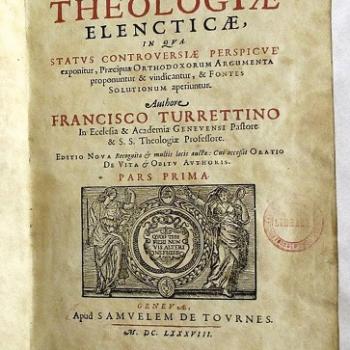
Atheist anti-theist Jonathan M. S. Pearce is the main writer on the blog, A Tippling Philosopher. His “About” page states: “Pearce is a philosopher, author, blogger, public speaker and teacher from Hampshire in the UK. He specialises in philosophy of religion, but likes to turn his hand to science, psychology, politics and anything involved in investigating reality.” His words will be in blue.
This is my fifth piece on Doubting Thomas and the issue of a supposedly “unfair” God, in response to Jonathan. I’ll be replying in the near future to additional papers of his on the same general topic. See the previous installments:
Pearce’s Potshots #17: Doubting Thomas & an “Unfair” God [3-17-21]
Pearce’s Potshots #18: Doubting Thomas & Evidence [3-18-21]
Pearce’s Potshots #19: Doubting Thomas & a “Mean God” [3-19-21]
Pearce’s Potshots #20: Unfair Meanie God & Unfree Will [5-7-21]
*****
This is a reply to Jonathan’s article, Do We All Have “Sufficient” Evidence to Believe? (4-28-21).
I have been having an ongoing argument over whether or not God is unfair in unequally distributing evidence over time and place in the world, thus giving people unequal opportunity of access to belief in God, of access to God and God’s love. . . .
Let me analogise.
Proposition: I have a litre of petrol. It is sufficient fuel to get me from Portsmouth to Southampton.
Scenario 1: I put the litre of petrol in my Ford Focus, the only car I own, and drive from Portsmouth to Southampton. The proposition is true.
Scenario 2: I put the litre of petrol in my Ford Focus, the only car I own, but the car has a fuel pump leak. I get halfway from Portsmouth to Southampton. The proposition is false.
Scenario 3: I put the litre of petrol in my Volkswagen Passat diesel, the only car I own, and attempt the drive. The car breaks down. The proposition is false.
Scenario 4: I put the litre of petrol in my Humvee, the only car I own. The vehicle gets halfway there. The proposition is false.
Scenario 5: I have no car. I am going to walk and use the petrol as fuel. I drink the petrol and die. The proposition is false. Or I don’t drink it and try to walk. But I can’t do it because I have multiple sclerosis. The proposition is still false.
The proposition that I have sufficient fuel to get me from Portsmouth to Southampton is true if and only if (considering these scenarios) I can drive, have a working Ford Focus, put the fuel in that car, and drive that vehicle. In all other scenarios, I do not have sufficient fuel to get from Portsmouth to Southampton. Therefore, the blanket use of “sufficient” is erroneous.
The analogy (and Jonathan’s overall argument) assumes, of course, that the evidence of God is of a one-dimensional, “one-size-fits-all”, single quality and quantity. It’s not. I do not assume that there is one kind of evidence that God offers, and/or that He offers the exact same amount to every human being.
This is a ridiculous notion that I reject every bit as much as Jonathan does (but with even more passion, because I think it is a blasphemous conception of the true God). I made this clear in one of my summary statements from my past papers on this topic that Jonathan cited in his article presently being critiqued:
I think God does provide sufficient evidence (of all sorts) for every human being, but human beings have various mechanisms by which they rationalize such things away or reject them. [bolding added now]
In my reply dated 3-19-21 I reiterated this in stronger terms:
He considers each person in their uniqueness and communicates to them enough for them to know (taking into account their particular background and outlook) that He exists and that He gives grace for salvation, and indeed is the key to human joy and fulfillment, and happiness. . . .
People have many many different outlooks and presuppositions; therefore, lesser or greater needs for particular forms of evidence and proofs and indications of any given thing (not all of which are empirical). God meets each of them where they are at (this is what we Christians believe). You’re critiquing our view as inconsistent and incoherent, and I keep saying you are mistaken as to what it is in the first place. You have to get it right before you set out to criticize it. [bolding added presently]
Jonathan, by contrast, caricatures my view, by characterizing it as God giving one “litre of petrol” [we Americans would say — less charmingly — “one gallon of gas”] to everyone, period. No distinctions are made for anyone’s situation being different. That was never my argument (it may be someone else’s, but not mine; nor, I submit, that of almost all informed Christians and different schools of Christianity throughout history).
Jonathan can keep caricaturing it, if he thinks that is an argumentation method that is impressive or effective or “sufficient” [pun intended], but it won’t do. In debate or dialogue, one has to deal with the actual opposition argument. Jonathan ludicrously caricatures my argument above as follows:
What Dave is erroneously saying is that 10 units of evidence that the moon landings never happened is sufficient for Harry to believe in the conspiracy theory; therefore, 10 units of evidence is sufficient for Julie.
But Julie is a scientist and a skeptic whose uncle worked on the NASA team. 10 units simply isn’t sufficient for her.
This is skeptical thinking 101.
There are all kinds of theistic evidences or arguments, and many that are not empirical. Here is a partial list of articles (from my first response on this topic) where I have dealt with this:
Is Christianity Unfalsifiable? Is Empiricism the Only True Knowledge? [5-6-17]
Science, Logic, & Math Start with Unfalsifiable Axioms [1-6-18]
Theistic Argument from Longing or Beauty, & Einstein [3-27-08; rev. 3-14-19]
Dialogue with an Agnostic: God as a “Properly Basic Belief” [10-5-15]
Non-Empirical “Basic” Warrant for Theism & Christianity [10-15-15]
Atheist Demands for “Empirical” Proofs of God [10-27-15]
One of my favorite arguments for God and theism is what is called implicit knowledge, or tacit knowing or innate knowledge (or what recently canonized Cardinal Newman called the “illative sense” in his brilliant 1870 tome on the philosophy of religion, An Essay in Aid of a Grammar of Assent (hugely influential on my own views). I attempted to describe these aspects in popular or nutshell fashion, in my own words in a 2015 dialogue with an atheist:
Virtually no one comes to initial faith in Jesus or conversion to Christianity through apologetics (and I know this firsthand, due to my own 34-year apologetics efforts, as both a Protestant and Catholic). I didn’t, myself. It is an interior spiritual experience or awareness which is key.
Lots of things are determined on a non-rational basis, such as choice of food, favorite colors for a room or clothes, picking a marriage partner, what determines the friends we pick out, the music we like, appreciation of nature or artistic beauty . . .
We don’t say that all of that is UNreasonable, simply because rationality is not the sole or primary determinant of those choices. It’s simply “other” than rationality. Matters of the heart or artistic taste are that. But I don’t see people running around chiding others for having a “blind faith” in Beethoven or the color blue or lovely sunsets or a preference for petite brunettes with big beautiful eyes (characteristics my wife has). We don’t call poets irrational simply for being poets. Yet poetry is a very subjective, often non-logical endeavor.
Likewise, religion is one of those things that function mostly on a basis of things other than reason and logic per se, while not necessarily being illogical or unreasonable.
Atheists say that Christians are anti-science merely because we also believe in God and think there are other epistemological considerations and ways of determining truth, like philosophy, and other philosophies besides the narrow atheist bubble-world of empiricism and logical positivism.
I would submit that most atheists don’t become so by virtue of cold, calculated logic. The reasons are usually highly subjective and emotional: they’re sick and tired of Christian rules, or they see Christians as hypocrites or sexually repressed or authoritarian or puritanical in a nauseating way, or they view them as opposed to science or reason.
These are all primarily subjective and emotional reasonings; ones of passion and defensiveness and being fed up. And they are the reasons we observe times without number in atheist rhetoric. The “reasons” for your atheism are manifest in what you guys talk (and complain) about. Atheists talk far more like disgruntled former employees or husbands / wives than dispassionate, objective philosophers.
And atheist reasonings and logical arguments are mostly accepted after the fact as well, just as Christian apologetics resonates far more with existing Christians than to non-Christians. This is how most people (theists and atheists alike) operate.
In a sermon in 1840 (while still an Anglican), “Implicit and Explicit Reason”, Newman laid out his basic thesis:
Nothing would be more theoretical and unreal than to suppose that true Faith cannot exist except when moulded upon a Creed, and based upon Evidence; yet nothing would indicate a more shallow philosophy than to say that it ought carefully to be disjoined from dogmatic and argumentative statements. To assert the latter is to discard the science of theology from the service of Religion; to assert the former, is to maintain that every child, every peasant, must be a theologian. Faith cannot exist without grounds or without an object; but it does not follow that all who have faith should recognize, and be able to state what they believe, and why. Nor, on the other hand, because it is not identical with its grounds, and its object, does it therefore cease to be true Faith, on its recognizing them. . . . True Faith, then, admits, but does not require, the exercise of what is commonly understood by Reason.
Reason, according to the simplest view of it, is the faculty of gaining knowledge without direct perception, or of ascertaining one thing by means of another. In this way it is able, from small beginnings, to create to itself a world of ideas, which do or do not correspond to the things themselves for which they stand, or are true or not, according as it is exercised soundly or otherwise. One fact may suffice for a whole theory; one principle may create and sustain a system; one minute token is a clue to a large discovery. The mind ranges to and fro, and spreads out, and advances forward with a quickness which has become a proverb, and a subtlety and versatility which baffle investigation. It passes on from point to point, gaining one by some indication; another on a probability; then availing itself of an association; then falling back on some received law; next seizing on testimony; then committing itself to some popular impression, or some inward instinct, or some obscure memory; . . . And such mainly is the way in which all men, gifted or not gifted, commonly reason,—not by rule, but by an inward faculty.
Here, then, are two processes, distinct from each other,—the original process of reasoning, and next, the process of investigating our reasonings. All men reason, for to reason is nothing more than to gain truth from former truth, without the intervention of sense; to which brutes are limited; but all men do not reflect upon their own reasonings, much less reflect truly and accurately, so as to do justice to their own meaning; but only in proportion to their abilities and attainments. In other words, all men have a reason, but not all men can give a reason. We may denote, then, these two exercises of mind as reasoning and arguing, or as conscious and unconscious reasoning, or as Implicit Reason and Explicit Reason. And to the latter belong the words, science, method, development, analysis, criticism, proof, system, principles, rules, laws, and others of a like nature.
Faith, then, though in all cases a reasonable process, is not necessarily founded on investigation, argument, or proof; these processes being but the explicit form which the reasoning takes in the case of particular minds.
For more along these lines, see: Implicit (Extra-Empirical) Faith, According to John Henry Newman [12-18-15]
There are (agree or disagree) many different arguments for God and Christianity. Even atheists and other skeptics acknowledge at least that the arguments exist, though they disbelieve in them. Here is one such book that lists 50 arguments.
In my earlier installments I argued at length about the factor of various reasons why people don’t believe: in theistic arguments or in any other sort of argument. Jonathan seems to completely ignore this relevant factor in the equation. There can be as many invalid or unsound reasons to not believe a theistic argument or tenet of Christianity as there are invalid or unsound reasons (so atheists contend) to believe in theism or Christianity. Human beings are not infallible rational machines, incapable of error in many sorts of ways.
Christians have developed all sorts of arguments regarding “salvation outside of Christianity / the catholic Church” through the centuries. This aspect of our views has been grotesquely caricatured as well. I have explained how, in the Christian, biblical view, an atheist absolutely can be saved if certain conditions are present:
Are Atheists “Evil”? Multiple Causes of Atheist Disbelief and the Possibility of Salvation [2-17-03]
New Testament on God-Rejecters vs. Open-Minded Agnostics [10-9-15]
This is not some new thing in Christianity or Catholicism in particular (some would say it was “new” after Vatican II: 1962-1965). It goes back at least as far as St. Thomas Aquinas in the 13th century. Fr. Alfredo M. Morselli clarifies this:
I call up here a distinction by St. Thomas:
a) “Unbelief by way of pure negation” (infidelitas secundum negationem puram) in case a man may “be called an unbeliever merely because he has not the faith” “in those who have heard nothing about the faith”; this Unbelief is not a sin -and b) “Unbelief by way of opposition to the faith” (infidelitas secundum contrarietatem ad fidem) when “a man refuses to hear the faith” (S.Th II II, 10,1 c); this Unbelief is a sin.
The fact that “unbelief by way of pure negation” is not a sin, is not only a Thomist concept, but it’s also a verity of faith: St. Pius V condemned the proposition “Infidelitas pure negativa in his quibus Christus non est predicatus peccatum est” (D +1068) (= Purely negative unbelief, in those whom Christ was not preached to, is a sin).
I am reasonable and I do demand more evidence. Furthermore, I would be so bold as to add that I demand more evidence precisely because I am sufficiently and arguably proficiently reasonable.
Yes, according to your experience, your abilities to reason, premises you have accepted, bias of predispositions and presuppositions, what you have read (and correctly or incorrectly understood) in atheist and Christian defenses and explanations, emotional factors, history of personal suffering and pain; these and many other factors put you in the place you are in.
Now the question is: how does God approach Jonathan M. S. Pearce or any other human being? The biblical revelation informs us that he desires for all men to be saved (universal atonement). This is not universalism: where all human beings are saved, but rather, a scenario where God gives all an equal chance to be saved, given what they know, and their unique life experience.
Thus, God would do all He can to save you (Jonathan), because He loves you and wants you to have joy and peace in this life and eternal bliss in union with Him in the next. He will use any and all means to make this happen (possibly including my feeble efforts in this very paper). He will incorporate into this effort His omniscient knowledge of what you require, etc.
But what you habitually ignore are the non-intellectual factors of human hardheartedness, rebellion, rejection of truths and facts, bias, prejudice, stubbornness, contentiousness, the effects of sins like pride and bitterness and lust, believing we have no inherent need of God (and many others). You simply say, “I have sincerely asked for evidence and God has provided insufficient evidence; therefore, I don’t believe.”
Fair enough, but of course we would have to examine and unpack all that. Why did you reject evidence #1 and #2 and #3 and #30, etc. Were your reasons sufficient. Were they based on caricatures even of what Christianity claims or God in the Bible claims?, etc. The abundance of felt reasons for the rejection of theism and Christianity are only as good as they can hold up under scrutiny. They are not strong simply because they are numerous. The same thing applies to the numerous theistic arguments.
So given that there is a range of 0% to, say, 99.9% evidence for the Christian god, from an Amazonian tribesperson living 2500 years ago to Thomas poking the resurrected Jesus’ body, somewhere in that range is a theoretical sweet spot where every “reasonable person” should believe in the Christian god.
Part of this evidence that is accessible to every human being is what St. Paul explains:
Romans 1:19-20 (RSV) For what can be known about God is plain to them, because God has shown it to them. [20] Ever since the creation of the world his invisible nature, namely, his eternal power and deity, has been clearly perceived in the things that have been made. So they are without excuse;
As I have documented in past installments, this evidence of the observable universe in its marvels and wonders was more than sufficient to cause even hard-nosed and brilliant scientists like Einstein and Hume to arrive at belief in pantheism and deism, respectively (both things other than atheism).
So we have evidence of among the most eminent philosophers and scientists being swayed by what may be described as a version of the old teleological argument (from design). It ain’t just ignorant, gullible fundamentalists who think the earth was created in six literal days and is 6,000 years old, who come to belief in such a manner.
In the next chapter, Paul talks about how a person is saved based on what they know. This is the “differential” which enables me to make my argument based on what we know about God from what Christians believe is His revelation:
Romans 2:6-16 For he will render to every man according to his works: [7] to those who by patience in well-doing seek for glory and honor and immortality, he will give eternal life; [8] but for those who are factious and do not obey the truth, but obey wickedness, there will be wrath and fury. [9] There will be tribulation and distress for every human being who does evil, the Jew first and also the Greek, [10] but glory and honor and peace for every one who does good, the Jew first and also the Greek. [11] For God shows no partiality. [12] All who have sinned without the law will also perish without the law, and all who have sinned under the law will be judged by the law. [13] For it is not the hearers of the law who are righteous before God, but the doers of the law who will be justified. [14] When Gentiles who have not the law do by nature what the law requires, they are a law to themselves, even though they do not have the law. [15] They show that what the law requires is written on their hearts, while their conscience also bears witness and their conflicting thoughts accuse or perhaps excuse them [16] on that day when, according to my gospel, God judges the secrets of men by Christ Jesus.
So someone who was brought up in a staunchly Islamic household (A), or a very atheistic household (B), will require different levels of evidence to believe in the Christian god than someone who was brought up in an evangelical household in Bible Belt America (C). This much should be pretty obvious. The evidence sufficient for C is vastly different than for A and B.
Yes, exactly! Thanks for belaboring the obvious.
We both have different desires about whether a god exists, . . .
Desire being one of those non-intellectual, non-empirical reasons . . . And these desires might include outright hostility to God or anything that requires allegiance to a set of moral rules, as a result of which one has to change their behavior. Aldous Huxley was actually honest enough (with himself and with others) to admit this, observing that atheists like himself had sexual desires that Christianity interfered with, so they chucked Christianity (I did largely the same as a red-blooded, nonconformist adolescent).
God is functional and when we replace a god with other things that do the same functional job, we have no need for a god in a psychological sense.
Precisely! This is almost an exact definition of what we Christians call idolatry: replacing God in one’s life with something else that they in effect “worship” or (to put it another way) place high in the scheme of things: very high in priorities as to what guides one’s life.
And out of our desires and functional requirements emerges confirmation bias. A, B and C will evaluate exactly the same evidence with very different metrics and outcomes.
And the questions then become: “why?” and (immediately after), “for what solid reasons does x accept or reject belief y?” It’s not a foregone conclusion that various reasons atheists provide for atheism are cogent or plausible, anymore than every reason Christians give is so. Each thing stands or falls on its own.
Again, I cannot stress this enough, that same amount of evidence is not sufficient for those three different people above. In this case, it is sufficient for C but not for A and B.
I’ve already agreed with this over and over, to no avail. But I’ll do it again now, hoping it’ll be grasped and that perhaps this time it will achieve a different result.
Theoretical sufficiency is simply not a robust enough benchmark to apply across humanity. When both of my interlocutors here talk about “sufficient”, what they really mean is “theoretically sufficient for someone who is just like me”.
The world doesn’t work like that.
I can’t speak for the other person, but this is almost the greatest conceivable opposite of what my view is. So we must wonder: how is it that Jonathan can characterize my view with such wild inaccuracy? How does that work? He’s neither dense nor stupid. To the contrary, he has a very able and lively intellect.
Every junior high debating class in its first session learns that the first rule of debate is to understand your opponents’ view even better than they do themselves. Jonathan can’t even get to first base in understanding what I am saying. This causes him to spin his wheels and endlessly repeat himself, which may masquerade as an effective argument, but is not in the slightest. We can’t even begin this discussion until he correctly, accurately understands my premises.
One can only keep trying . . .
***
Photo credit: Nick Youngson [The Blue Diamond Gallery / CC BY-SA 3.0 license]
Summary: Jonathan M. S. Pearce chips away at the concept of sufficient evidence for theism, but unfortunately he grotesquely caricatures what my argument actually is & dismisses the straw man.
***













